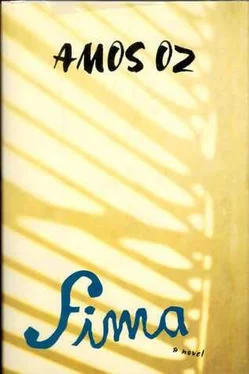"Right," said Ted, and after consideration, after tamping and re-lighting again, slowly and intently, he added mildly: "Yael does voluntary work twice a week at the Council for the Advancement of Tolerance. But they say there's going to be a split in the Council." And he added, uncertain of the meaning of the Hebrew word, "What do you mean by 'petition'?"
"Petition?" Fima replied. "A scrap of paper. Masturbation." He was so enraged that he thumped the keyboard of the word processor accidentally with his fist.
"Hey, watch out," Ted said. "If you break my computer, that won't help the Arabs."
"Who the hell's talking about helping the Arabs?" Fima erupted in an injured roar. "I'm talking about helping ourselves…. It's just them, the nuts, the right, who say we're helping the Arabs!"
"I don't get it," said Ted, scratching his tousled hair in a kind of overacted portrayal of someone who is slow on the uptake. "Do you mean that we're not trying to improve the Arabs' living conditions?"
So Fima started from square one, suppressing his anger with difficulty. He explained in simple Hebrew his view of the tactical and psychological factors that made the moderate left appear to the masses to be identifying itself with the enemy. He fumed at himself again for using that wretched expression "the masses." In the course of his lecture he noticed that Ted was stealing sideways glances at the diagrams scattered on the rug, while his hairy finger kept tamping down the tobacco in his pipe. His wedding ring glinted on his finger.
Fima strove in vain to dispel the mental picture of that same finger prodding with the selfsame motion at Yael's labia. He instantly fell prey to a suspicion that he was being lied to and deceived, that Yael was hiding from him in the bedroom, weeping silently, with shaking shoulders, stifling her tears in the pillow, as she sometimes wept in the middle of sex and as Dimi sometimes wept soundlessly when he became aware of injustice perpetrated against him or against one of his parents or Fima.
"In any civilized country," Fima continued, unconsciously borrowing Dr. Wahrhaftig's pet phrase, "there would be a campaign of civil disobedience by now. A common front of workers and students would have forced the government to end the horror at once."
"Let me get you another brandy, Fima. It'll calm you down."
Fima feverishly downed the brandy in one gulp, tipping his head back the way Russians drink vodka in the movies. He could see a detailed image of this log with steel-wool eyebrows bringing Yael a glass of orange juice in bed on Saturday morning, and of her, drowsily, luxuriantly, with her eyes still half-closed, reaching out and stroking the opening of his pajamas, which were doubtless made of real silk. The image aroused in Fima not jealousy or rage or fury but, to his astonishment, profound pity for this diligent, upright man, who made one think of a beast of burden, working day and night at his computer, searching for a way to perfect the jet propulsion of vehicles, and with barely a single friend in the whole of Jerusalem.
"The saddest thing," Fima said, "is the way the left is paralyzed."
Ted said: "True. You're quite right. It was much the same with us at the time of Vietnam. Coffee? "
Fima followed him to the kitchen and continued heatedly:
"The comparison with Vietnam, that's our biggest mistake, Teddy. This is not Vietnam and we're not the flower people. The second mistake is to expect the Americans to do the job for us and get us out of the Territories. What do they care if we're going to the devil?"
"True," said Ted, in the tone he used for praising Dimi for getting his sums right. "Too right. Nobody docs anybody else any favors. Everyone looks after himself. And they don't always even have enough sense for that." He put the kettle on and started emptying the dishwasher.
Fima excitedly pushed Ted out of the way and started to help him unbidden, as though bent on proving him wrong. He pulled a large handful of knives, forks, and spoons out of the dishwasher and ran around the kitchen with them, flinging doors open, pulling out drawers, looking for somewhere to unload his booty, and not interrupting for a moment his lecture on the difference between Vietnam and Gaza and between the Nixon syndrome and the Shamir syndrome. A few stray items of cutlery slipped through his fingers and lay scattered on the kitchen floor. Ted bent down to pick them up, and expressed his unfamiliarity with the Hebrew word for "syndrome": was it a newly invented word?
"Syndrome: like the Vietnam syndrome that you went through in the States."
"Didn't you say a moment ago that the comparison with Vietnam was a mistake?"
"Yes. No. In a certain sense yes. That is, perhaps we need to distinguish between a syndrome and a symptom."
"Here," said Ted, "just put them here in the middle drawer."
But Fima had already abandoned the struggle, and left his bundle of cutlery on top of the microwave. Pulling his handkerchief out of his pocket, he wiped his nose again and then absent-mindedly set about wiping the kitchen table too, while Ted was still sorting plates according to type and size and putting each pile away in its proper place in the cupboard over the sink.
"Fima, why don't you give that to the newspapers. You should publish it so that more people can read it. Your language is so rich. And it'll do your soul good too: anyone can sec you're suffering. You take politics so personally. You take the situation too much to heart. Yael will be back with Dimi in another three-quarters of an hour. Now I've got to do some work. How do you say 'deadline' in Hebrew again? Maybe the best thing would be if you took your coffee with you into the living room and I'll put the TV on for you; you can still catch about half the news. Okay?"
Fima immediately assented: he had never intended to intrude for the whole evening. But instead of picking up his coffee and heading for the living room, he forgot the mug on the drainboard in the kitchen and insisted on pursuing Ted all the way down the hallway until Ted excused himself and locked himself in the bathroom. Fima concluded his sentence through the locked door:
"It's all right for you people; you've got U.S. passports, you can always get out of here by jet propulsion. But what'll happen to the rest of us? Okay, I'll go and watch the news. I won't pester you anymore. The only trouble is, I have no idea how to switch your television on."
Instead of going to the living room, he turned in to the boy's bedroom. Instantly he was overcome by great tiredness. Unable to find the light switch, he lay down in the dark on the little bed surrounded by shadows of robots and airplanes and time machines, while overhead a gigantic phosphorescent spaceship hovered, suspended from the ceiling by an invisible thread, its nose pointing straight at him, revolving slowly, menacingly at the slightest draft like an accusing finger. Until Fima closed his eyes and said to himself suddenly:
"What's the point of all this talking? The die is cast, and what is done cannot be undone."
Then sleep overtook him. Just as he was dropping off, he was vaguely aware of Ted covering him with a soft woollen blanket. Indistinctly he mumbled:
"The truth, Teddy? Just between the two of us? The Arabs have evidently realized that they can't throw us in the sea. The sad thing is, it's hard for Jews to live without someone wanting to throw them in the sea."
Ted whispered:
"No. The situation really isn't looking too good." And he went out.
Fima curled up inside the blanket. He meant to ask to be waked up the moment Yael got home. He was so tired that what came out was:
"Don't wake Yael."
He slept for about twenty minutes, and when the phone rang in the next room, he reached out and knocked over one of Dimi's Lego towers. He tried to fold the blanket, but gave up because he was in a hurry to find Ted. He still had to explain what it was that had brought him here this evening. Instead of going to the study, he strayed into the bedroom, which was lit by a warm red night-light. He saw that the wide bed was ready for the night: two identical pillows, two dark-blue blankets encased in silky sheets, two bedside tables, each with an open book lying face down on it, and he buried his face and his whole head in Yael's nightdress. At once he pulled himself together and rushed out to look for his coat. He searched every room in the flat with a sleepwalker's thoroughness, but he found neither Ted nor his coat, even though he doggedly checked every lighted place. Finally he sank down onto a stool in the kitchen and looked around for the knives that he hadn't been able to find a place for earlier.
Читать дальше












